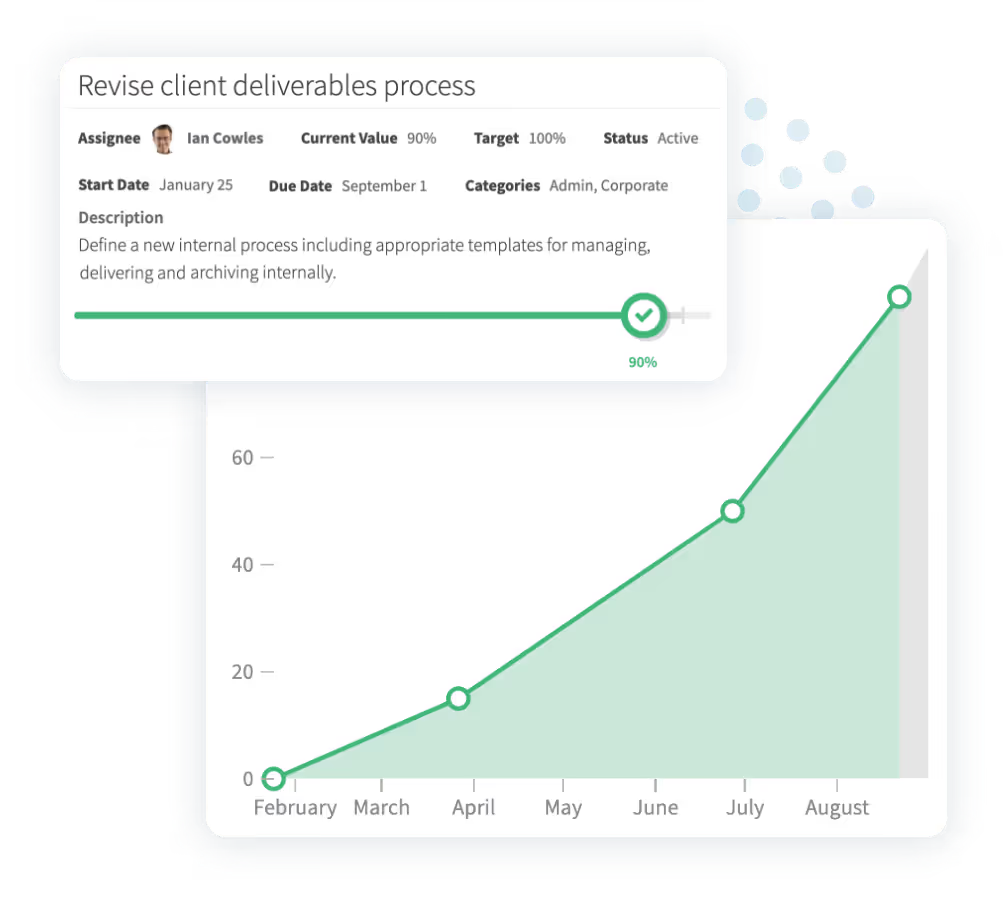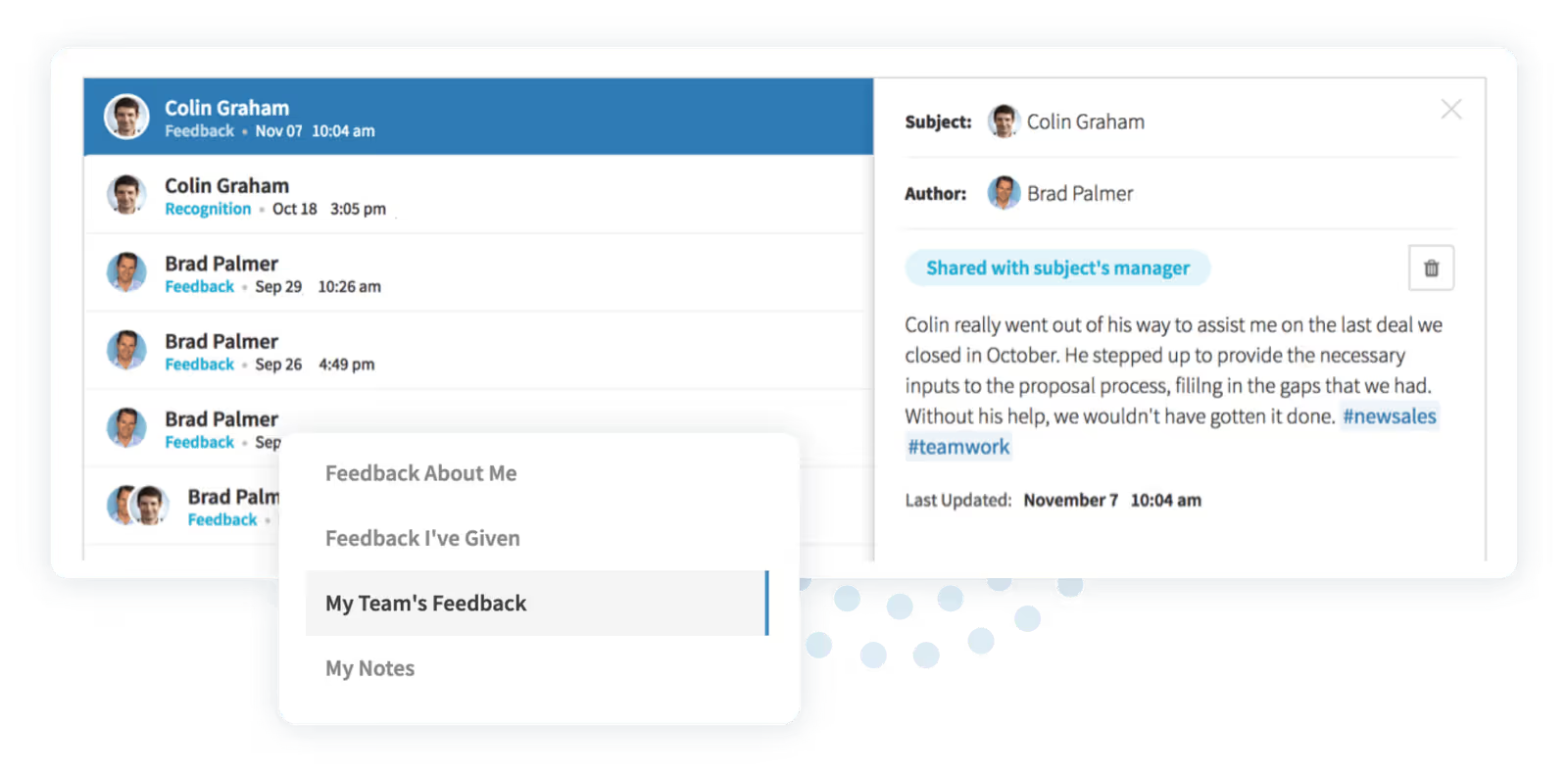How to Design an Attorney Performance Review Process
Attorney performance reviews are different from your typical employee review. While the reviews may measure common objectives like new client wins or teamwork, they must also evaluate the factors that make successful attorneys, not just employees.
How have the attorney’s clients rated them?
How well have they developed junior associates?
How do they contribute to team profitability?
The tips in this post will help you craft a meaningful law firm employee performance evaluation. You’ll find specific metrics to evaluate an attorney's performance and even get a head start on creating your review.
5 Tips for an Effective Attorney Performance Review
The following five tips are a place to start measuring attorney performance. However, don’t try to boil the ocean. Take the time to build a concise list of metrics that are most impactful to your employee, team, and firm.
1. Bring Measurable Goals into the Review Process
Goals provide a baseline upon which to start the review process. According to Edge International, one category could be “outcome measures”—or the outputs and results the attorney has already achieved. Here are some examples of performance goals for lawyers; these can be quantitative, qualitative, or both.
Quantitative measures include:
- Billable hours
- Realization rates—the difference between recorded time and the percentage of that time clients paid.
- Value/price of engagements negotiated
- How much the employee has contributed financially to the firm, such as fees-per-earner.
Qualitative metrics could include:
- Junior staff retention rate
- File and client audits
- Training, coaching, and developing associates

2. Formalize Peer Feedback
Incorporating positive feedback into the review process is a must. Don’t just limit it to feedback from a manager to a direct report—get input from peers too.
This step is easy in PerformYard. The software helps law firms capture informal feedback, save it in an employee’s profile, and make it available to look at during reviews. Emphasizing an attorney’s strengths and highlighting them in reviews puts the attorney in a position to succeed.

3. Stay Current on Cases with Quarterly Reviews and 1:1s
An annual review at a law firm is fine, but it should be aided by quarterly reviews and 1:1s.
Attorneys may work on many cases throughout the year, and it’s hard to capture a clear view of all that work after a full year. Plans could’ve been diverted, there could’ve been staffing changes, etc.
Quarterly reviews and 1:1s allow attorneys to review more recent work and make improvements during the middle of the year instead of waiting 365 days.
4. Use Performance Reviews to Build Mentorship
Mentorship is vital at law firms, and performance reviews provide a chance for managers and attorneys to connect. However, that doesn’t happen at firms that only use annual reviews or downward reviews.
Upward reviews allow attorneys to get a chance to provide feedback to the people above them and build stronger relationships. 1:1s provide the same opportunity.
Creating a review cycle with 1:1s, quarterly reviews, and annual reviews gives attorneys plenty of chances to connect and increases the odds of your firm having a strong mentorship culture.
5. Use Review Form Software to Formalize the Process
It can be daunting for an HR person at a law firm to revamp a review process set in stone for years. However, software like PerformYard can take your current process and streamline it, centralize it, and make it easier to execute.
Notifications, stored feedback, custom review cycles, and custom review forms make the process of running performance reviews easier for HR people.
Building a culture of strong performance starts with showing your firm that you’re committed to the performance review process. Using dedicated software can help send that message. Plus, it’s easy enough for anyone to use, even longtime lawyers who are used to using paper forms.

Example Phrases & Comments for Attorney Reviews
Positive Feedback Examples
- Client Relations: "Your ability to build strong relationships with clients has been exceptional. Your empathetic approach and clear communication have greatly contributed to client satisfaction and retention."
- Legal Expertise: "Your depth of legal knowledge, especially in [specific area of law], is impressive. Your expertise has been a valuable asset in handling complex cases and has led to successful outcomes."
- Attention to Detail: "Your meticulous attention to detail has been crucial in reviewing and drafting legal documents. This skill has prevented potential oversights and has been instrumental in protecting our clients' interests."
- Effective Advocacy: "Your advocacy skills in the courtroom are commendable. You've consistently demonstrated the ability to present arguments persuasively and effectively, which has been key in winning cases."
- Mentoring Junior Staff: "Your willingness to mentor junior attorneys and staff has positively impacted our firm's culture. Your guidance has helped in nurturing the next generation of legal professionals within our organization."
Critical Feedback Examples
- Time Management: "While your legal skills are outstanding, improving time management could enhance your effectiveness. Better prioritization of tasks and adherence to deadlines will help in managing caseloads more efficiently."
- Interdepartmental Collaboration: "Increasing collaboration with other departments could improve case strategies. Leveraging diverse perspectives within the firm can lead to more comprehensive and robust legal solutions."
- Business Development: "Developing stronger skills in business development is important for your career growth. Engaging more actively in networking events and client outreach can contribute to the firm’s growth and your personal practice development."
- Adaptability to Technological Changes: "Adapting to new legal technologies is essential in today's legal landscape. Embracing these tools can enhance efficiency in your work and keep our firm competitive."
- Work-Life Balance: "While your dedication is evident, it's important to maintain a healthy work-life balance. Managing your workload to prevent burnout will sustain your long-term productivity and well-being."
Attorney Review Templates to Get You Started
If you’re ready to change how you do your performance reviews for your attorneys, you’re in the right place. You can customize the following review templates specifically for attorneys.
Click here to see the six modern performance review templates
You can also get a quick demo of PerformYard to see how the software can streamline your firm’s attorney review, so you don’t have to use paper / PDF templates.




.jpg)
